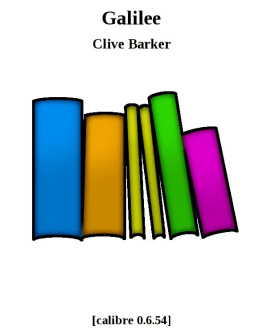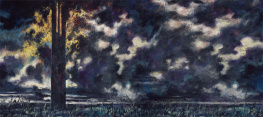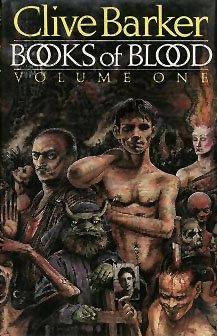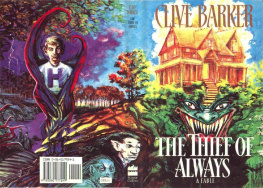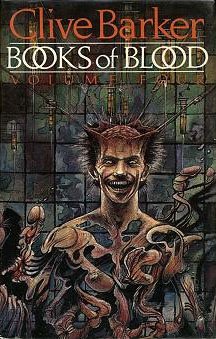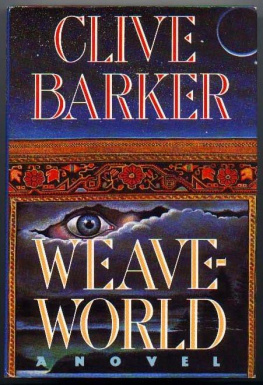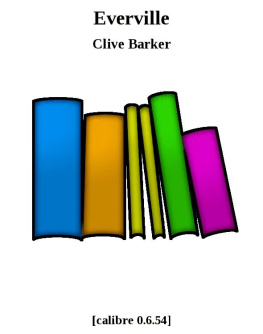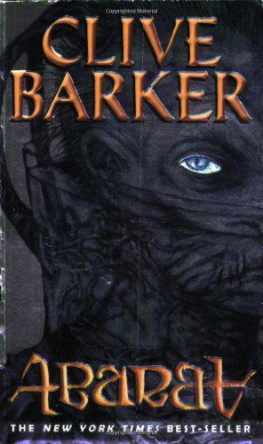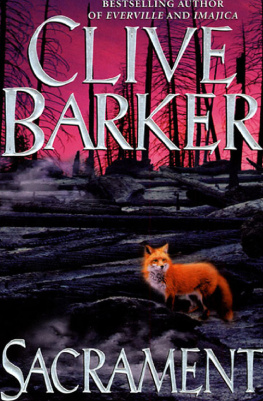Barker, Clive
Galilee
For Emilian David Armstrong
ACKNOWLEDGEMENTS
Thankfully, I did not take this voyage alone. I'd like to offer here a few words of appreciation to those who have accompanied me.
To Vann Sauls, of McGee's Crossroads, North Carolina, for his friendship, his wit, and for the insights he imparted as we explored the Carolinas together. Without our conversations wandering the midnight streets of Charleston, and the woods at Bentonville, where the armies of North and South clashed so calamitously, this book would be much impoverished.
To Robb Humphreys and Joe Daley, who assisted me in my more obscure researches, never failing to find on the library shelves books that contained some vital nugget of information.
To my dear Anna Miller, who along with Robb and Joe runs our film production company here in LA. While I've been at sea with Galilee, ^he's kept the seductions and the insanities of this town at bay with chair .and whip.
To Don Mackay, who did me the great honor of making the typing of this manuscript his only distraction from his true vocation, which is that of actor.
And finally, to David John Dodds, who makes the world in which I live and work run like clockwork, a far from easy task. He has been my friend and guardian spirit for thirteen years. None of this would be possible without his love and faith in me.
C.B.
PART ONE. The Time Remaining
I
A the insistence of my stepmother Cesaria Barbarossa he house in which I presently sit was built so that it faces southeast. The architect-who was no lesser man than the third President of the United States, Thomas Jefferson-protested her desire repeatedly and eloquently. I have the letters in which he did so here on my desk. But she would not be moved on the subject. The house was to look back towards her homeland, towards Africa, and he, as her employee, was to do as he was instructed.
It's very plain, however, reading between the lines of her missives (I have those too; or at least copies of them) that he is far more than an architect for hire; and she to him more than a headstrong woman with a perverse desire to build a house in a swamp, in North Carolina, facing southeast. They write to one another like people who know a secret.
I know a few myself; and luckily for the thoroughness of what follows I have no intention of keeping them.
The time has come to tell everything I know. Failing that, everything I can detect or surmise. Failing that, everything I can invent. If I do my job properly it won't even matter to you which is which. What will appear on these pages will be, I hope, a seamless history, describing deeds and destinies that will range across the world. Some of them will be, to say the least, strange events, enacted by troubled and unpalatable souls. But as a general rule, you should assume that the more unlikely the action I lay upon this stage for you, the more likely it is that I have evidence of its having happened. The things I will invent will be, I suspect, mundane by comparison with the truth. And as I said, it's my intention that you should not know the difference. I plan to interweave the elements of my story so cunningly that you'll cease to even care whether an event happened out there in the same world where you walk, or in here, in the head of a crippled man who will never again move from his stepmother's house.
This house, this glorious house!
When Jefferson labored on its designs he was still some distance from Pennsylvania Avenue, but he was by no means an unknown. The year was 1790. He had already penned the Declaration of Independence, and served in France as the US Minister to the French government. Great words had flowed from his pen. Yet here he is taking time from his duties in Washington, and from work in his own house, to write long letters to my father's wife, in which the business of constructing this house and the nuances of his heart are exquisitely interlaced.
If that is not extraordinary enough, consider this: Cesaria is a black woman; Jefferson, for all his democratic protestations, was the owner of some two hundred slaves. So how much authority must she have had over him, to be able to persuade him to labor for her as he did? It's a testament to her powers of enchantment-powers which in this case she exercised, as she was fond of saying, "without the juju." In other words: in her dealings with Jefferson she was simply, sweetly, even innocently, human. Whatever capacities she possesses to supematurally beguile a human soul-and she possesses many-she liked his clear-sightedness too well- to blind him that way. If he was devoted to her, it was because she was worthy of his devotion.
* * *
They called the house he built for her L'Enfant. Actually, I believe the full name was L'Enfant des Carolinas. I can only speculate as to why they so named it.
That the name of the house is in French is no big surprise: they met in the gilded salons of Paris. But the name itself? I have two theories. The first, and the most obvious, is that the house was in a sense the product of their romance, their child if you will, and they named it accordingly. The second, that it was the infant of an architectural parent, the progenitor being Jefferson's own house at Monticello, into which he poured his genius for most of his life. It's bigger than Monticello by a rough measure of three (Monticello is eleven thousand square feet; I estimate L'Enfant to be a little over thirty-four thousand) and has a number of smaller service buildings in its vicinity, whereas Jefferson's house is a single structure, incorporating the slave and servant quarters, the kitchen and toilet facilities, under one roof. But in other regards the houses are very similar. They're both Jeffersonian reworkings of Palladian models; both have double porticoes, both have octagonal domes, both have capacious high-ceilinged rooms and plenty of windows, both are practical rather than glamorous houses; both, I'd say, are structures that bespeak great confidence and great love.
Of course their settings are radically different. Monti-cello, as its name suggests, is set on a mountain. L'Enfant sits on a plot of low-lying ground forty-seven acres in size, the southeastern end of which is unredeemable swamp, and the northern perimeter wooded, primarily with pine. The house itself is raised up on a modest ridge, which protects it a little from the creeping damps and rots of this region, but not enough to stop the cellar from flooding during heavy rain, and the rooms getting damnably cold in winter and humid as hell in summer. Not that I'm complaining. L'Enfant is an extraordinary house. Sometimes I think it has a soul all of its own. Certainly it seems to know the moods of its occupants, and accommodates them.
There have been times, sitting in my study, when a black thought has crept into my psyche for some reason, and I swear I can feel the room darken in sympathy with me. Nothing changes physically-the drapes don't dose, the stains don't spread-but I nevertheless sense a subtle transformation in the chamber; as if it wishes to fall in rhythm with my mood. The same is true on days when I'm blithe, or haunted by doubts, or merely feeling lazy. Maybe if s Jefferson's genius that creates the illusion of empathy. Or perhaps it's Cesaria's work: her own genius, wedded with his. Whatever the reason, L'Bnfant knows us. Better, I sometimes think, than we know ourselves.
I share this house with three women, two men, and a number of indeterminates.
The women are of course Cesaria and her daughters, my two half-sisters, Marietta and Zabrina. The men? One is my half-brother Luman (who doesn't actually live in the house, but outside, in a shack on the grounds) and Dwight Huddie, who serves as majordomo, as cook and as general handyman: I'll tell you more about him later. Then, as I said, there's the indeterminates, whose number is, not surprisingly, indeterminate.
Next page
